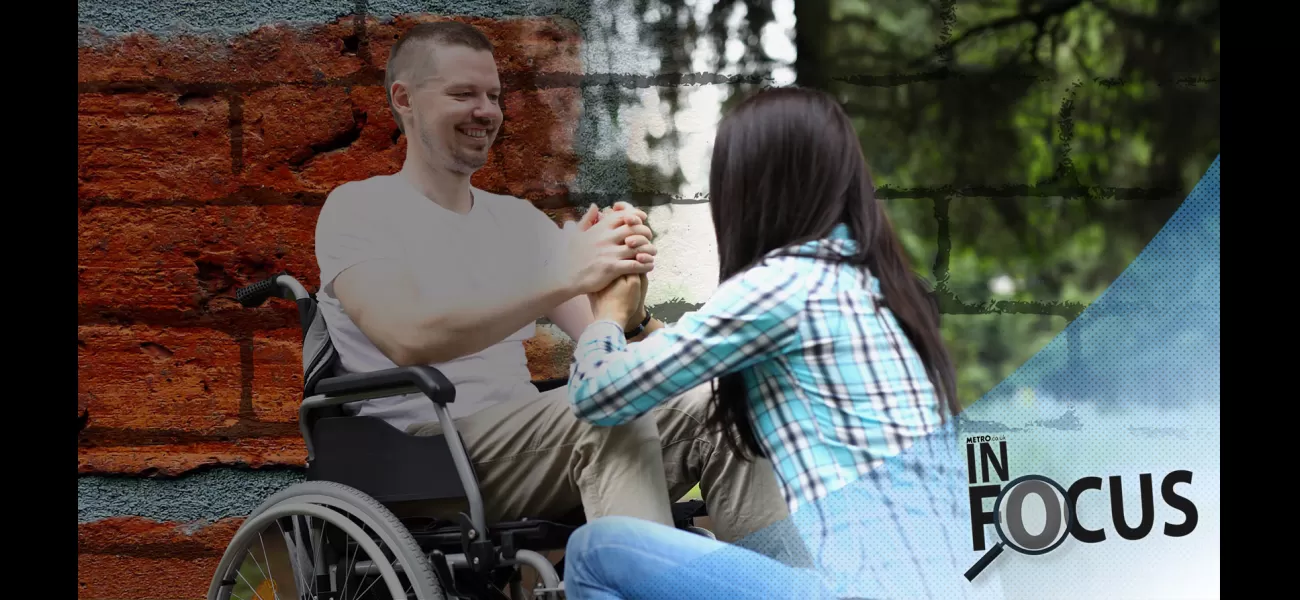High living costs caused us to break up, it's better if we live separately.
Without my PIP, we'd need to split up to avoid suffering.
August 9th 2024.

"It's like a never-ending cycle of sacrifice for both of us," Carrie explains, her voice tinged with weariness. She and her husband Aiden have been married for almost 30 years, but for the past 11 years, they've had to rely on a single income to make ends meet. "Sometimes, I think that if something were to happen to me, Aiden wouldn't even be able to afford to bury me," she says matter-of-factly. "We've joked that the only way we could survive without struggling is if we got divorced."
Carrie, now 52, was initially granted Disability Living Allowance in 2006. But in 2017, she had to switch to Personal Independence Payment (PIP) due to her multiple conditions, including complex regional pain syndrome and fibromyalgia. "When we got married, we promised that if one of us couldn't work, the other would take care of everything," Carrie shares. "But now, 'everything' has shrunk to just five tasks a day, and even that can be a struggle on bad days."
Unfortunately, Aiden's income as an electrical maintenance engineer from his nightshift work puts them above the income threshold, making them ineligible for means-tested benefits. This means that the burden of supporting their household in Halifax, West Yorkshire, falls solely on Aiden's shoulders. And the rising cost of living has occasionally pushed them into debt. For example, Aiden had to take out a bank loan to pay for a more accessible bathroom, and they had to dip into his pension to make their kitchen wheelchair friendly.
"Before I qualified for free prescriptions, there were times when Aiden had to choose between getting me my pain relief or buying basic food for the family," Carrie recalls. "Even though our boys, who are now grown men, never complained about feeling deprived, I couldn't shake off the sense of failure as a parent. If the costs of my disability were covered without taking away from their needs, they would have had an easier time growing up."
Despite the financial strain, Carrie still manages to maintain an infectious laugh and a bright smile. But she admits that it doesn't always keep the feeling of hopelessness at bay. "It's hard when I can't contribute financially beyond using my PIP for household expenses," she confesses. "I feel worthless, sick, and guilty...it's a constant struggle."
PIP, or Personal Independence Payment, is designed to cover the extra living costs incurred by disabilities. The maximum amount a claimant can receive per week is £108.55 for daily living and £75.75 for mobility assistance, which amounts to around £740 per month. Other means-tested benefits, like Income-Related Employment Support Allowance and Housing Benefits, can help bridge financial gaps, but only if the claimant's capital is below a certain threshold.
A spokesperson from the Department of Work and Pensions explains, "If a claimant has other sources of income, such as their partner's earnings or savings, their benefit entitlement will be adjusted accordingly." This means that assessments for means-tested benefits take into account a person's total capital, including income, savings, and assets. If their capital exceeds a certain limit, it affects the benefits they can receive.
Recently, Carrie had to replace their stairlift, but the cost of £4000 was beyond what her PIP could cover. "Thankfully, the council agreed to pay half, and Aiden and my mother managed to pool their resources to buy a second-hand one for £1400," she shares. "But the guilt is killing me, especially since Aiden had a heart attack last year. He's fine now, but it's taking a toll on him to work full-time nights as a Type 1 diabetic. It's like a never-ending cycle of sacrifice for both of us."
Living in financial hardship is a reality for many disabled individuals in the UK. For those who live alone, PIP is not affected by income or savings. However, if a claimant moves in with a partner or gets married, means-tested benefits can be adjusted or removed if their partner earns above a certain threshold. This was the case for 39-year-old Holly Donovan, who moved in with her partner Dave Allen after being together for five and a half years.
"I've made my peace with the fact that I can never have children due to my past cancer treatment," Holly shares. "But I also thought that I could never get married because it would mean a life of poverty." Holly was previously eligible for means-tested benefits like Universal Credit, Council Tax Support, and Housing Benefit. However, when she moved in with Dave, who earns above the threshold, they lost access to these benefits.
"It was a difficult decision, but we chose to be together even if it meant living in poverty," says Dave, who works as a Progress Mentor. "We have to make do with just my income, and Holly's PIP, which is meant to cover her needs, often goes towards our rent and bills." They have to be very careful with their spending, limiting social activities, and rationing their electricity and heating usage, even though Holly is highly sensitive to cold due to a metal rod in her spine.
Despite their best efforts, the couple still worries about their financial stability, especially with the unpredictable cost of living. "I enjoy my job, but it's disheartening to work and have nothing to show for it," Dave says. "We're grateful to have a roof over our heads, but there are times when we have to sit in the dark because we can't afford to pay the electricity bill."
"I never thought I would become financially dependent on someone else," Holly admits. "It's my greatest fear, and it's a constant struggle for both of us."
"Carrie and her husband Aiden have been happily married for nearly thirty years, but their life together has not been without its challenges. For the last eleven years, they have had to rely on a single income and constantly struggle to make ends meet.
Carrie shares with Metro that if something were to happen to her, Aiden would not have the means to pay for her funeral. In fact, they have found that the only way they could survive without enduring extreme financial hardship would be to get divorced. This unfortunate reality has been their constant companion since Carrie was first granted Disability Living Allowance in 2006 and then transitioned to Personal Independence Payment in 2017. She suffers from multiple conditions, including complex regional pain syndrome and fibromyalgia, which require extra expenses to manage.
The couple had always agreed that if one of them was unable to work, the other would take care of them. However, as Carrie's health deteriorated, their definition of "taking care" has significantly changed. On her worst days, Carrie can only manage about five tasks, leaving Aiden to pick up the slack. Despite his tireless efforts, his income as an electrical maintenance engineer on night shifts puts them above the threshold for means-tested benefits, leaving them to navigate the cost-of-living crisis on their own.
The financial pressure has taken its toll on the couple, and they have occasionally found themselves in debt. They have had to use Aiden's pension and take out loans to make necessary home modifications to accommodate Carrie's mobility needs. Even with these changes, they still struggle to cover their mortgage and other household expenses, often having to choose between paying for essential items and basic necessities.
Carrie's health conditions also require expensive medication, and before she qualified for free prescriptions, there were times when Aiden had to choose between buying her pain relief or basic groceries. This has caused Carrie to feel guilty and like a burden to her family. Despite these challenges, she maintains a positive attitude and tries to make the most of her situation.
Unfortunately, Carrie's PIP is not enough to cover all their expenses, and she often finds herself unable to contribute financially beyond using it for household needs. This has led to feelings of worthlessness and hopelessness for Carrie, who wishes she could do more to support her family.
The Department of Work and Pensions spokesperson explains that means-tested benefits take into account the total capital of a household, including income and savings. This means that Aiden's income disqualifies them from receiving additional support, leaving them to rely solely on his wages to cover all their expenses.
The financial struggles faced by Carrie and Aiden are not unique. Many disabled individuals and families in the UK are also finding themselves in similar situations. For those who live alone, PIP is not affected by income or savings. However, if a claimant moves in with a romantic partner whose income exceeds a certain threshold, their means-tested benefits may be adjusted or removed.
Holly Donovan and her partner Dave Allen faced this reality when they decided to move in together. Holly, who was previously eligible for means-tested benefits due to her long-term disability caused by childhood cancer, had to give up those benefits once she moved in with Dave, whose income is above the threshold. This has left the couple struggling to get by on a single income, often having to make difficult choices and sacrifices.
Despite the challenges, Holly and Dave choose to see the positive in their situation. They are grateful to have each other and understand that their love is worth more than any financial struggles. They have learned to be creative and resourceful in managing their expenses and are constantly adjusting to the ever-changing cost of living.
However, the fear of being financially dependent on someone else, which was once Holly's greatest fear, has now become a reality. But despite this, they continue to support each other and make the most of their situation. As Carrie and Aiden's story shows, the cost of living crisis and means-tested benefits can put a strain on any relationship, but it is the love and support of a partner that helps them navigate through it all."
Carrie, now 52, was initially granted Disability Living Allowance in 2006. But in 2017, she had to switch to Personal Independence Payment (PIP) due to her multiple conditions, including complex regional pain syndrome and fibromyalgia. "When we got married, we promised that if one of us couldn't work, the other would take care of everything," Carrie shares. "But now, 'everything' has shrunk to just five tasks a day, and even that can be a struggle on bad days."
Unfortunately, Aiden's income as an electrical maintenance engineer from his nightshift work puts them above the income threshold, making them ineligible for means-tested benefits. This means that the burden of supporting their household in Halifax, West Yorkshire, falls solely on Aiden's shoulders. And the rising cost of living has occasionally pushed them into debt. For example, Aiden had to take out a bank loan to pay for a more accessible bathroom, and they had to dip into his pension to make their kitchen wheelchair friendly.
"Before I qualified for free prescriptions, there were times when Aiden had to choose between getting me my pain relief or buying basic food for the family," Carrie recalls. "Even though our boys, who are now grown men, never complained about feeling deprived, I couldn't shake off the sense of failure as a parent. If the costs of my disability were covered without taking away from their needs, they would have had an easier time growing up."
Despite the financial strain, Carrie still manages to maintain an infectious laugh and a bright smile. But she admits that it doesn't always keep the feeling of hopelessness at bay. "It's hard when I can't contribute financially beyond using my PIP for household expenses," she confesses. "I feel worthless, sick, and guilty...it's a constant struggle."
PIP, or Personal Independence Payment, is designed to cover the extra living costs incurred by disabilities. The maximum amount a claimant can receive per week is £108.55 for daily living and £75.75 for mobility assistance, which amounts to around £740 per month. Other means-tested benefits, like Income-Related Employment Support Allowance and Housing Benefits, can help bridge financial gaps, but only if the claimant's capital is below a certain threshold.
A spokesperson from the Department of Work and Pensions explains, "If a claimant has other sources of income, such as their partner's earnings or savings, their benefit entitlement will be adjusted accordingly." This means that assessments for means-tested benefits take into account a person's total capital, including income, savings, and assets. If their capital exceeds a certain limit, it affects the benefits they can receive.
Recently, Carrie had to replace their stairlift, but the cost of £4000 was beyond what her PIP could cover. "Thankfully, the council agreed to pay half, and Aiden and my mother managed to pool their resources to buy a second-hand one for £1400," she shares. "But the guilt is killing me, especially since Aiden had a heart attack last year. He's fine now, but it's taking a toll on him to work full-time nights as a Type 1 diabetic. It's like a never-ending cycle of sacrifice for both of us."
Living in financial hardship is a reality for many disabled individuals in the UK. For those who live alone, PIP is not affected by income or savings. However, if a claimant moves in with a partner or gets married, means-tested benefits can be adjusted or removed if their partner earns above a certain threshold. This was the case for 39-year-old Holly Donovan, who moved in with her partner Dave Allen after being together for five and a half years.
"I've made my peace with the fact that I can never have children due to my past cancer treatment," Holly shares. "But I also thought that I could never get married because it would mean a life of poverty." Holly was previously eligible for means-tested benefits like Universal Credit, Council Tax Support, and Housing Benefit. However, when she moved in with Dave, who earns above the threshold, they lost access to these benefits.
"It was a difficult decision, but we chose to be together even if it meant living in poverty," says Dave, who works as a Progress Mentor. "We have to make do with just my income, and Holly's PIP, which is meant to cover her needs, often goes towards our rent and bills." They have to be very careful with their spending, limiting social activities, and rationing their electricity and heating usage, even though Holly is highly sensitive to cold due to a metal rod in her spine.
Despite their best efforts, the couple still worries about their financial stability, especially with the unpredictable cost of living. "I enjoy my job, but it's disheartening to work and have nothing to show for it," Dave says. "We're grateful to have a roof over our heads, but there are times when we have to sit in the dark because we can't afford to pay the electricity bill."
"I never thought I would become financially dependent on someone else," Holly admits. "It's my greatest fear, and it's a constant struggle for both of us."
"Carrie and her husband Aiden have been happily married for nearly thirty years, but their life together has not been without its challenges. For the last eleven years, they have had to rely on a single income and constantly struggle to make ends meet.
Carrie shares with Metro that if something were to happen to her, Aiden would not have the means to pay for her funeral. In fact, they have found that the only way they could survive without enduring extreme financial hardship would be to get divorced. This unfortunate reality has been their constant companion since Carrie was first granted Disability Living Allowance in 2006 and then transitioned to Personal Independence Payment in 2017. She suffers from multiple conditions, including complex regional pain syndrome and fibromyalgia, which require extra expenses to manage.
The couple had always agreed that if one of them was unable to work, the other would take care of them. However, as Carrie's health deteriorated, their definition of "taking care" has significantly changed. On her worst days, Carrie can only manage about five tasks, leaving Aiden to pick up the slack. Despite his tireless efforts, his income as an electrical maintenance engineer on night shifts puts them above the threshold for means-tested benefits, leaving them to navigate the cost-of-living crisis on their own.
The financial pressure has taken its toll on the couple, and they have occasionally found themselves in debt. They have had to use Aiden's pension and take out loans to make necessary home modifications to accommodate Carrie's mobility needs. Even with these changes, they still struggle to cover their mortgage and other household expenses, often having to choose between paying for essential items and basic necessities.
Carrie's health conditions also require expensive medication, and before she qualified for free prescriptions, there were times when Aiden had to choose between buying her pain relief or basic groceries. This has caused Carrie to feel guilty and like a burden to her family. Despite these challenges, she maintains a positive attitude and tries to make the most of her situation.
Unfortunately, Carrie's PIP is not enough to cover all their expenses, and she often finds herself unable to contribute financially beyond using it for household needs. This has led to feelings of worthlessness and hopelessness for Carrie, who wishes she could do more to support her family.
The Department of Work and Pensions spokesperson explains that means-tested benefits take into account the total capital of a household, including income and savings. This means that Aiden's income disqualifies them from receiving additional support, leaving them to rely solely on his wages to cover all their expenses.
The financial struggles faced by Carrie and Aiden are not unique. Many disabled individuals and families in the UK are also finding themselves in similar situations. For those who live alone, PIP is not affected by income or savings. However, if a claimant moves in with a romantic partner whose income exceeds a certain threshold, their means-tested benefits may be adjusted or removed.
Holly Donovan and her partner Dave Allen faced this reality when they decided to move in together. Holly, who was previously eligible for means-tested benefits due to her long-term disability caused by childhood cancer, had to give up those benefits once she moved in with Dave, whose income is above the threshold. This has left the couple struggling to get by on a single income, often having to make difficult choices and sacrifices.
Despite the challenges, Holly and Dave choose to see the positive in their situation. They are grateful to have each other and understand that their love is worth more than any financial struggles. They have learned to be creative and resourceful in managing their expenses and are constantly adjusting to the ever-changing cost of living.
However, the fear of being financially dependent on someone else, which was once Holly's greatest fear, has now become a reality. But despite this, they continue to support each other and make the most of their situation. As Carrie and Aiden's story shows, the cost of living crisis and means-tested benefits can put a strain on any relationship, but it is the love and support of a partner that helps them navigate through it all."
[This article has been trending online recently and has been generated with AI. Your feed is customized.]
[Generative AI is experimental.]
0
0
Submit Comment




